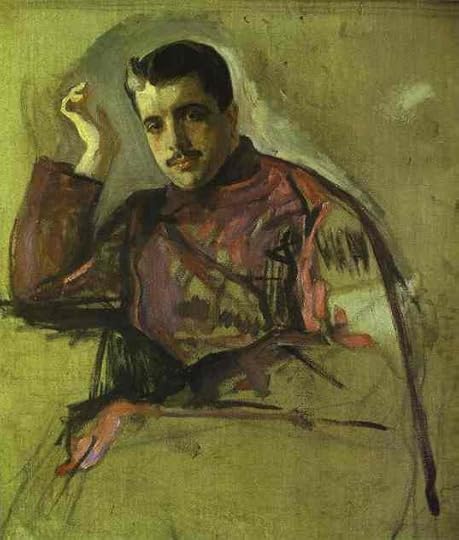Terry Teachout's Blog, page 50
October 13, 2013
TT: Just because
(This is the latest in a series of arts-related videos that appear in this space each Monday and Wednesday.)
TT: Almanac
Dashiell Hammett (interview, Washington Daily News, March 1956)
HOW THE VCR CHANGED THE WAY WE WATCH MOVIES
October 10, 2013
TT: Once again, this is it
In honor of the great day, I offer you my official fingers-crossed video, which I've posted on the mornings of the opening nights of all of my previous works for the stage. May it serve us equally well this time around:
TT: Big barrel, rubber fish
* * *
Movies used to get made out of musicals. Now it's the other way round: "Big Fish" is based on Tim Burton's 2003 film version of Daniel Wallace's novel about an amiable blowhard whose final illness and death bring his son face to face with the meaning of life. "Big Fish" was one of those nominally serious Hollywood movies in which watered-down Christian symbolism is enlisted in the service of New Age spiritualism, a footless pseudo-religion that demands nothing of its adherents save the inchoate desire to be happier. On Broadway, the content-free feel-goodism of Mr. Burton's film becomes a devout belief in the transfiguring power of the production number....
 The conceit of "Big Fish" is that Edward Bloom (Norbert Leo Butz) is a compulsive fabulist who specializes in taller-than-tall stories in which he is invariably the hero: "Be the hero of your story if you can/Be the champion in the fight/Not just the man." Among those present are a giant, a mermaid, and Will (Bobby Steggert), Edward's sober-sided son, who has always been embarrassed by his father's fantasies and now longs to know if there was any truth to them at all.
The conceit of "Big Fish" is that Edward Bloom (Norbert Leo Butz) is a compulsive fabulist who specializes in taller-than-tall stories in which he is invariably the hero: "Be the hero of your story if you can/Be the champion in the fight/Not just the man." Among those present are a giant, a mermaid, and Will (Bobby Steggert), Edward's sober-sided son, who has always been embarrassed by his father's fantasies and now longs to know if there was any truth to them at all.You can, I suspect, guess the rest, just as you've probably already figured out that "Big Fish" adds up to little more than a long string of loosely strung musical numbers in which Edward's extravagant tales of derring-didn't are dramatized. Though there's a plot of sorts, you may find it hard to understand why you should care about it, especially since the climactic epiphany is as sappy as it's predictable.
John August, whose book is based on his screenplay for Mr. Burton's film, has contrived to trivialize something that was more than trivial enough to begin with. He had plenty of help, though, from Andrew Lippa, lately of "The Addams Family," whose songs blend theme-park pop with greeting-card lyrics to babyishly banal effect....
* * *
Read the whole thing here .
TT: The gadget that turned movies into art
* * *
Is film a fine art? I don't know many people who'd claim otherwise, even after watching this summer's parade of brain-deadening blockbusters. Any medium that has been used to create such permanent masterpieces as, say, "Chinatown," "Rashomon" or "The Rules of the Game" no longer has anything to prove. But was film a fine art in 1913? And how about 1933, or 1963? While most moviegoers would likely answer in the affirmative, I beg to differ. As far as I'm concerned, it wasn't until 1983--just 30 years ago--that movies became more than a species of purely popular entertainment.
Born in 1956, I grew up in in a small Missouri town that had only one single-screen movie theater. The only "arty" films I saw there were Franco Zeffirelli's adaptation of "Romeo and Juliet" and Stanley Kubrick's "2001: A Space Odyssey." What's more, the nearest public TV station was in St. Louis, just beyond the range of our rooftop antenna (this was well before the coming of cable TV). It wasn't until after I left home that I saw any pre-1950 movies...
In 1975 I enrolled in a small college located in a suburb of Kansas City. I had a tiny TV set in my dorm but was too busy going to class to watch it more than sporadically, and my school had no film series. At that time, Kansas City was home to two "art houses," one of which showed first-run foreign films and the other domestic revivals. I doubt I saw more than a dozen "classic" films in the second of those theaters, none of them more than once. As a result, I failed to absorb the concept of Film as Art....
 What changed my point of view? The VHS videocassette recorder, which was introduced to the U.S. by JVC in 1977. Like many other Americans, I bought my first VCR in 1983, six years later, right around the time that prices were coming down. "Citizen Kane" and "Grand Illusion" were the first "classic" films of which I owned VHS copies. I'd never seen either one before, and I'll never forget how thrilling it was to be able to view them at will.
What changed my point of view? The VHS videocassette recorder, which was introduced to the U.S. by JVC in 1977. Like many other Americans, I bought my first VCR in 1983, six years later, right around the time that prices were coming down. "Citizen Kane" and "Grand Illusion" were the first "classic" films of which I owned VHS copies. I'd never seen either one before, and I'll never forget how thrilling it was to be able to view them at will.If you're under the age of 50, or if you grew up in a film-friendly city like Chicago or New York, my experience will almost certainly be alien to you. I can assure you, though, that it was not merely common but normal. Today's youngsters simply can't imagine the overwhelming power of the cultural transformation that was made possible by the invention of the VCR....
* * *
Read the whole thing here .
TT: Almanac
Wesley Stace, Charles Jessold, Considered as a Murderer
October 9, 2013
TT: A preview of coming attractions
 I thought you might possibly enjoy taking a peek at two short excerpts from the libretti for The King's Man and Danse Russe, my two most recent operatic collaborations with Paul Moravec, which are being produced as a double bill in Louisville this weekend by Kentucky Opera.
I thought you might possibly enjoy taking a peek at two short excerpts from the libretti for The King's Man and Danse Russe, my two most recent operatic collaborations with Paul Moravec, which are being produced as a double bill in Louisville this weekend by Kentucky Opera.
The first number, "I Was Born on a Sunday," is an arietta from The King's Man that is sung by Benjamin Franklin, who is attempting to explain to William, his illegitimate son, why he is at one and the same time a "Puritan prig" (in William's contemptuous phrase) and a carefully discreet sexual libertine:
FRANKLIN I was born on a Sunday
In the shadow of an angry God,
Baptized on the day of my birth
Into a gray, Puritan life
To save me from the fires of hell.
They believed that a child born on a Sunday
Must be a child of Satan.
This was my youth,
From the Puritans of Boston
To the Quakers of Philadelphia:
From same to same,
Gray to gray,
Hard work, cold baths,
Hatred of the joys of the flesh.
Damn it all!
God damn it all!
No God of love
Would make such a place,
Cold as ice,
Sharp as a knife,
No joy...
No life.

The second is the reprise of "Astonish Me," a comic waltz that is sung by Sergei Diaghilev, Igor Stravinsky, Vaslav Nijinsky, and Pierre Monteux moments before the curtain goes up on the 1913 premiere of The Rite of Spring.
The title of the number is the scandal-courting Diaghilev's oft-quoted two-word explanation of what he expected out of his artistic collaborators. He actually said it to Jean Cocteau, not the makers of The Rite of Spring, but I allowed myself the artistic liberty of extracting the phrase from its original context and using it here:
DIAGHILEV What's the worst they can do?
They can hiss,
They can boo,
And I'll laugh
And I'll say,
Vas te faire enculé!
So...
ALL Astonish me!
We'll pull all the stops out
And make the welkin ring!
Astonish me!
They'll call all the cops out
To stop The Rite of Spring!
MONTEUX Let them do what they please!
STRAVINSKY Let them try! Let them dare!
NIJINSKY Let them stand on their seats!
MONTEUX Let the orchestra blare!
DIAGHILEV Let them tear up their programs
And tear out their hair--
ALL And their chattering neighbors
Will wish they'd been there!
DIAGHILEV If we must,
We'll flee.
STRAVINSKY Even take to sea.
DIAGHILEV But I guarantee--
You'll astonish me!
ALL Astonish me!
TT: So you want to see a show?
Here's my list of recommended Broadway, off-Broadway, and out-of-town shows, updated weekly. In all cases, I gave these shows favorable reviews (if sometimes qualifiedly so) in The Wall Street Journal when they opened. For more information, click on the title.
BROADWAY:
• Annie (musical, G, closing Jan. 5, reviewed here)
• Matilda (musical, G, nearly all performances sold out last week, reviewed here)
• Once (musical, G/PG-13, reviewed here)
OFF BROADWAY:
• Avenue Q (musical, R, adult subject matter and one show-stopping scene of puppet-on-puppet sex, reviewed here)
• The Fantasticks (musical, G, suitable for children capable of enjoying a love story, reviewed here)
CLOSING SOON OFF BROADWAY:
• Natural Affection (drama, R, closes Oct. 26, reviewed here)
• Philip Goes Forth (drama, G, not suitable for small children, closes Oct. 27, reviewed here)
CLOSING SOON IN ASHLAND, OREGON:
• My Fair Lady (musical, G, closes Nov. 3, reviewed here)
CLOSING SOON IN NIAGARA-ON-THE-LAKE, ONTARIO:
• Our Betters (comedy, PG-13, closes Oct. 27, reviewed here)
• Major Barbara (drama, PG-13, closes Oct. 19, reviewed here)
CLOSING NEXT WEEK IN SPRING GREEN, WISCONSIN:
• Antony and Cleopatra (Shakespeare, PG-13, closes Oct. 20, reviewed here)
• Dickens in America (one-man play, G, too demanding for small children, closes Oct. 19, reviewed here)
CLOSING NEXT WEEK OFF BROADWAY:
• The Old Friends (drama, PG-13, closes Oct. 20, reviewed here)
Terry Teachout's Blog
- Terry Teachout's profile
- 45 followers



